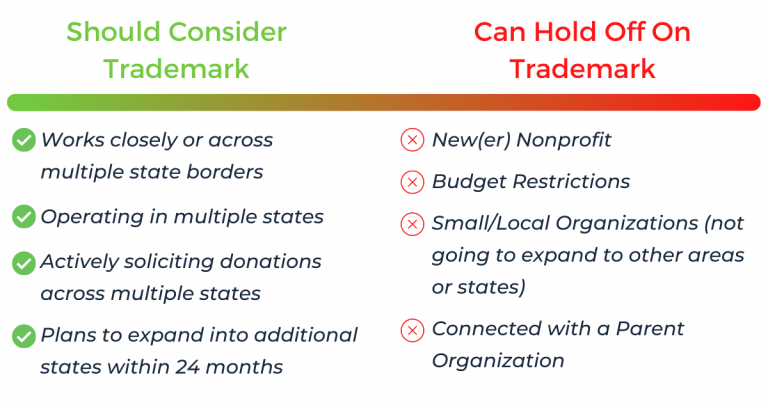What is a trademark?
Both private business and nonprofit trademarks are brand identifiers. They inform your customers, supporters, donors, and the communities your nonprofit serves as to the nature of the work your organization carries out.
Well-known examples of the power trademarks carry in the nonprofit sector include the YMCA and the American Heart Association’s branding. A trademark grants you exclusive control and protection of your organization’s unique logo, name, and words used in your public description. A robust trademark also helps communicate what kinds of services, goods, or activities you offer to the public.
Should I Trademark My Nonprofit's Name?
The most secure way to trademark your nonprofit’s name is to file a federal registration. However, obtaining a trademark can involve significant paperwork, in addition to submission fees and yearly license renewals.
Obtaining a trademark for your nonprofit organization should be built into your organization’s business plan and budget forecasting. For example, some entrepreneurs prefer to get their nonprofit trademark before delivering their community programs and services. In contrast, others may prefer to wait a year or more until finalizing the legal registration.
However, suppose you’re concerned about protecting your nonprofit’s brand identity but don’t yet have sufficient funds to trademark your nonprofit’s name. In that case, there’s a bit of good news in the way of common law protections.
Common-Law Protections for Nonprofit Trademarks
While obtaining a trademark is the most secure way to safeguard your organization’s brand identity, name, and words used to describe its public mission, you are not required to trademark your nonprofit organization to have legal protection. However, common law protection can be established when you actively and publicly use your organization’s brand identity (logo, name, descriptive words) to communicate its role and services to the community it supports. Ways to actively and publicly display a brand identity include using it on your organization’s website, social media platforms, email signatures, stationery, and printed materials such as brochures, postcards, or items such as t-shirts, tote bags, or bumper stickers.
When you routinely use your organization’s name or logo within the community you serve, you will be able to develop common law trademark rights for the region where you use your nonprofit trademark.
As part of the process of creating your nonprofit 501c3 organization, you will need to determine that no other business or organization is currently using or has previously trademarked your nonprofit’s name. Often, the group that has been actively using a trademark for the longest time is the one that has common law rights.
Nonprofit Trademark Benefits

Avoiding Infringement

Enforcing Rights

Awareness

Expansion

Exclusive Rights

Dispute Resolution

Access to Federal Courts

Protection from Damages
When does it make sense for a nonprofit to purchase a trademark?
The chart below shows when you should consider a trademark for your nonprofit’s name and when you can wait to formalize your brand identity. The key reasons why you’ll need a nonprofit trademark is if your organization is operating in more than one state, is actively fundraising in more than one place, or has firm plans to expand the organization’s reach to other geographic areas within the next two years.

What is included in BryteBridge's nonprofit trademark services?
Using our trademark services, you can expect the following:
- Comprehensive Federal Trademark Search
- Definitive answer in all 6 major refusal categories
- Expedited 24-hour filing
- Get your serial number fast
- The government filing fee for 1 class of goods/services as dictated by the United States Patent and Trademark Office (USPTO)
- 3 years of direct-hit trademark monitoring
- Lifetime maintenance dates notifications
- Unlimited procedural office action responses
- Give your trademark the best possible chance at registering
- Trademark information collected and assembled by a trademark specialist

Need More Information
About Nonprofit Trademarks?
Call us at 877-857-9002
Or
fill out the form below, and we will reach out to you.
"*" indicates required fields


